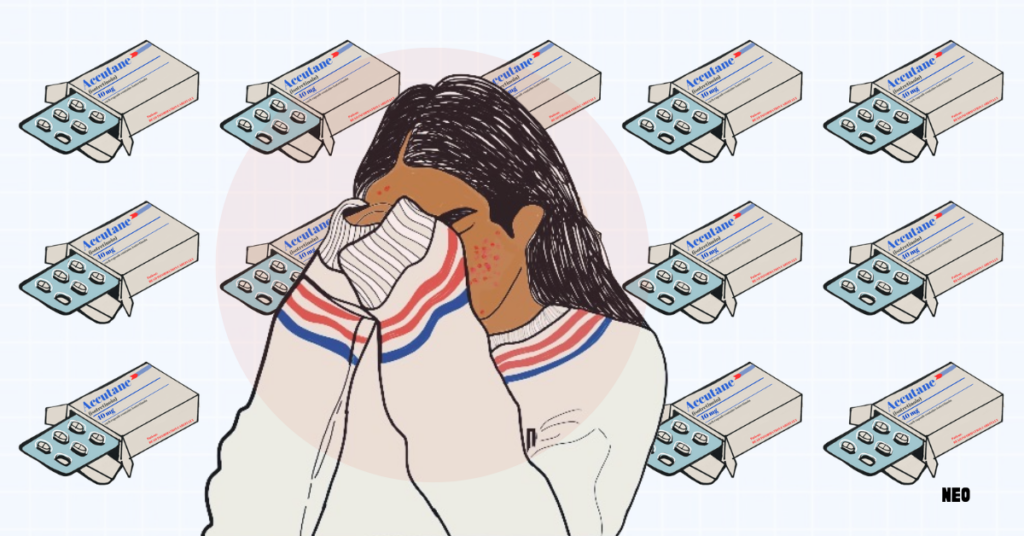Emilia Osmund remembers the whispers and awkward glances she would get on her high school playground and corridors. “I heard she’s on that acne drug that gives you manic depression,” they would say. “I swear she’s the one on that pill that turns people psychotic.” She was half tempted to believe these rumours after seeing them plastered all over social media. But perhaps most convincing of all, the packaging of her medication read very clearly, “may cause: depression, psychosis and, rarely, suicidal ideation, suicide attempts, suicide, and aggressive or violent behaviours.”
An expert review into the safety of Isotretinoin by the UK government in April found no definite link between Isotretinoin and psychiatric side effects, but the “individual experiences of patients and families continue to cause concern.” As a result, they recommended a “tightening of the use of the medicine for young people under 18″. This can only be used in extreme cases, and two prescribers must agree that the acne is severe enough to need the medication. The Medicines and Healthcare Products and Regulatory Agency (MHRA) is expected to adopt these changes to make the drug safer.
But more advanced studies would challenge this move, Dr Bethanee Schlosser of the American Academy of Dermatologists (AAD) compared the mental health of acne sufferers who did not take the drug to those that did. Her study “found absolutely no difference between the depression suffered by acne patients taking Isotretinoin and those who did not. In fact, the latter was more likely to get depression.” She said, “this study goes as far as to show that for many people this drug provides significant relief from stubborn acne and the psychological distress that comes as a result.”
After the suicide of Annabel Wright in 2019, her parents blamed Roacccutane – a brand of acne drug. However, during the inquest in late 2021 the coroner ruled there was “no evidence” Isotretinoin caused or contributed to her death.
While debate over Isotretinoin’s links to depression rage on, one thing that does not is its proven success in curing acne. About 50% of people who take it never need to treat their acne again. The standard prescribed daily dose of Accutane reduces oily skin by 90% within 6 weeks, and according to some studies it permanently reduces acne for 80% of people.
“We found absolutely no difference between the depression suffered by acne patients taking Isotretinoin and those who did not”
Emilia was first prescribed Accutane in 2017 when she was 16. She had suffered from cystic acne since the age of 12 and had been bullied about her skin heavily in school. The trauma she suffered as a result drove her to depression. “I couldn’t say anything too loud because people could always respond with some insult about my skin. It just caused this unavoidable self-loathing, and in the school holidays I literally wouldn’t get out of bed,” she says. This went on for four years.
Emilia’s mother ended up getting her medical help. “I tried various creams and things knowing that if they didn’t work, I would eventually be put on Accutane,” says Emilia. She read about Accutane and saw the psychiatric health warnings, but says, “my honest reaction to that was to wonder how on earth I could feel any worse than I did already, and so when the doctor warned me about the side effects I really wasn’t worried. I was actually excited.”
The drug completely changed Emilia’s life. “I remember one day getting ready to go on a date whilst I was at university in Bath, and I think it was the first time I looked in the mirror and thought wow I actually look good,” she says. When asked about how she felt about young people’s access to the drug being restricted following the latest review, she says, “Well for me it would have taken a hell of a lot longer to get a hell of a lot better. Literally, nothing worked anywhere near as well. In my case, it would have just been prolonging my suffering.”
Clinical psychologists are still hesitant to make firm claims about the link between depression and acne medication. Dr John Mayer says it is impossible to disentangle the two because low self-esteem is often a common denominator of both. “The problem is that people who are prescribed Isotretinoin have acne and all the extended consequences that come with it such as low self esteem and so these people are vulnerable to depression before they even take the drug.”
Emilia is now happily travelling with her boyfriend around Southeast Asia, a life she never imagined possible during her years battling with cystic acne and the depression it brought upon her. Her transformation is attributed to one life-changing decision: taking Accutane. Emilia’s journey serves as a timeless reminder that, while caution and awareness of potential side effects are essential, it is equally crucial to remember that stigmatisation of treatments through under-researched claims about their side effects can deprive people of something that has the potential to transform their lives.
Illustration: Neomi Parikh

